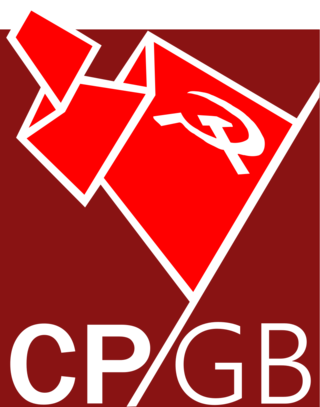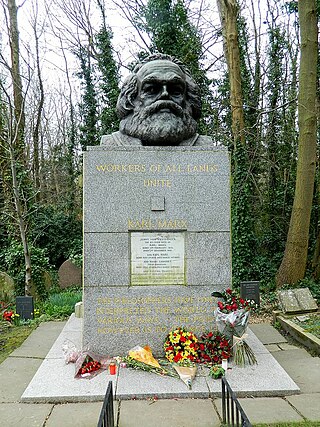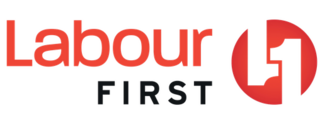
The Independent Labour Party (ILP) was a British political party of the left, established in 1893 at a conference in Bradford, after local and national dissatisfaction with the Liberals' apparent reluctance to endorse working-class candidates. A sitting independent MP and prominent union organiser, Keir Hardie, became its first chairman.

The Communist Party of Great Britain is a political group which publishes the Weekly Worker newspaper. The CPGB (PCC) claims to have "an internationalist duty to uphold the principle, 'One state, one party'. To the extent that the European Union becomes a state then that necessitates EU-wide trade unions and a Communist Party of the EU". In addition, it is in favour of the unification of the entire working class under a new Communist International. It is not to be confused with the former Communist Party of Great Britain, the Communist Party of Great Britain (Marxist–Leninist), or the current Communist Party of Britain.

The Labor Left (LL), also known as the Progressive Left, Socialist Left or simply the Left, is one of the two major political factions within the Australian Labor Party (ALP). It is nationally characterised by social progressivism and democratic socialism and competes with the more economically liberal Labor Right faction.
The Socialist Campaign Group, also simply known as the Campaign Group, is a UK parliamentary caucus of the Labour Party including Members of Parliament in the House of Commons. The group also includes some MPs who formerly represented Labour in Parliament but have had the whip withdrawn or been expelled from the party.

Tribune is a democratic socialist political magazine founded in 1937 and published in London, initially as a newspaper, then converting to a magazine in 2001. While it is independent, it has usually supported the Labour Party from the left. Previous editors at the magazine have included Aneurin Bevan, the minister of health who spearheaded the establishment of the National Health Service, former Labour leader Michael Foot, and writer George Orwell, who served as literary editor.
The soft left, also known as the open left, inside left and historically as the Tribunite left, is a faction within the British Labour Party. The term "soft left" was coined to distinguish the mainstream left, represented by former leader Michael Foot, from the hard left, represented by Tony Benn. People belonging to the soft left may be called soft leftists or Tribunites.
The Centre-Left Grassroots Alliance (CLGA) is a centre-left group of elected members on the Labour Party's National Executive Committee, founded in 1998. They represent members from a broad spectrum of the Labour membership, ranging from the centre-left to those on the left-wing.
The Labour Representation Committee (LRC) is a British socialist pressure group within the Labour Party and wider labour movement. It is often seen as representing the most left-wing members of the Labour Party.
The British left can refer to multiple concepts. It is sometimes used as shorthand for groups aligned with the Labour Party. It can also refer to other individuals, groups and political parties that have sought egalitarian changes in the economic, political, and cultural institutions of the United Kingdom. There are various sub-groups, split between reformist and revolutionary viewpoints. Progressives and social democrats believe that equality can be accommodated into existing capitalist structures, but they differ in their criticism of capitalism and on the extent of reform and the welfare state. Anarchists, communists, and socialists, among others on the far left, on the other hand argue for abolition of the capitalist system.
The Labour Party is a political party in the United Kingdom that sits on the centre-left of the political spectrum. The party has been described as an alliance of social democrats, democratic socialists and trade unionists. It is one of two dominant political parties in the United Kingdom, along with the Conservative Party. The party has been led by Keir Starmer since 2020. Starmer became UK Prime Minister and formed a Labour government following the 2024 general election. To date, there have been thirteen Labour governments and seven Labour prime ministers - MacDonald, Attlee, Wilson, Callaghan, Blair, Brown and Starmer.

The Communist Party of Britain (CPB) is a communist party in Great Britain which emerged from a dispute between Eurocommunists and Marxist-Leninists in the Communist Party of Great Britain in 1988. It follows Marxist-Leninist theory and supports what it regards as existing socialist states. The party has fraternal relationships with the ruling parties in Cuba, China, Laos, and Vietnam. It is affiliated nationally to the Cuba Solidarity Campaign and the Venezuela Solidarity Campaign. It is a member of the International Meeting of Communist and Workers' Parties, together with 117 other political parties. After the fall of the Soviet Union, the party was one of two original British signatories to the Pyongyang Declaration.

Socialism in the United Kingdom is thought to stretch back to the 19th century from roots arising in the English Civil War. Notions of socialism in Great Britain have taken many different forms from the utopian philanthropism of Robert Owen through to the reformist electoral project enshrined in the Labour Party that was founded in 1900 and nationalised a fifth of the British economy in the late 1940s.
The Alliance for Workers' Liberty (AWL), also known as Workers' Liberty, is a Trotskyist group in Britain and Australia, which has been identified with the theorist Sean Matgamna throughout its history. It publishes the newspaper Solidarity.
The Campaign for Labour Party Democracy (CLPD) is a group of Labour Party activists campaigning for changes to the constitution of the Labour Party to ensure that Labour MPs and Labour governments enacted policies agreeable to the party membership. It was founded by activists in 1973, with support from about ten Labour MPs, and its first President was Frank Allaun. A leading co-founder was Vladimir Derer, and his house in Golders Green became CLPD's headquarters for about twenty-five years.

The Stop the War Coalition (StWC), informally known simply as Stop the War, is a British group that campaigns against the United Kingdom's involvement in military conflicts.
Vladimir Derer (1919–2014) was a British political activist in the Labour Party who escaped from Czechoslovakia in the late 1930s to live in Britain. For nearly four decades Vladimir was an important leader and strategist in the campaign to transform the Labour Party by making it more democratic and accountable to its members. He helped to form the Campaign for Labour Party Democracy (CLPD) in 1973 and was its secretary from 1974 until 2005. The CLPD is dedicated to introduce constitutional and rule changes and modernise the governance of the Party. Mandatory reselection of MPs and electoral college for the Leader were the most notable of many important democratic reforms implemented from the late 1970s until today.
Momentum is a British left-wing political organisation which has been described as a grassroots movement supportive of the Labour Party; since January 2017, all Momentum members must be members of the party. It was founded in 2015 by Jon Lansman, Adam Klug, Emma Rees and James Schneider after Jeremy Corbyn's successful campaign to become Labour Party leader and it was reported to have between 20,000 and 30,000 members in 2021.

Make Votes Matter is a political pressure group based in the United Kingdom which campaigns for replacing the first-past-the-post voting system with one of proportional representation for elections to the British House of Commons.

Far-left politics in the United Kingdom have existed since at least the 1840s, with the formation of various organisations following ideologies such as Marxism, revolutionary socialism, communism, anarchism and syndicalism.

Labour First is a British political organisation associated with the Labour Party. It was originally founded in 1980 but refounded in 1988. Born out of the political right wing of the Labour Party's struggles with its left wing, it sees itself as protecting the tradition of the "old Labour right". It has been described externally as "the voice of the party’s traditional right" and "a group on the right of the party". It organises petitions, endorses likeminded candidates, and runs events.









